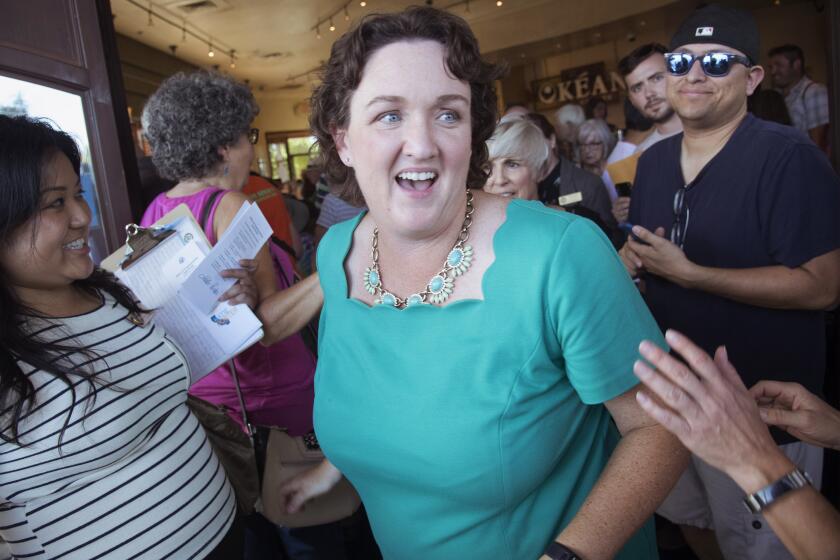‘Baskin-Robbins’ Voting
- Share via
I am a dual citizen. I had never voted outside the United States until this year, when the Belgian government sent me an absentee ballot for its 2003 parliamentary elections.
That vote was more empowering than any I had cast in 31 years of voting in the U.S.
The first surprise was the range of choice. Our ballot choices in the U.S. are usually limited to two parties. Even then, only about one in 10 House of Representatives contests is competitive; 98% of incumbents were reelected in 2002. Is it any wonder most Americans don’t vote?
The Belgian ballot offered a choice of 29 parties, covering almost as many flavors of policy alternatives as Baskin-Robbins offers in ice cream. Researching the party sites on the Internet, I found just the right flavor and color. Green. Not mint, of course, but a party representing environmental interests. It was an option I would have never chosen in the U.S., because it would mean “wasting” my vote and probably helping elect the candidate I most disliked.
But in Belgium, that vote -- which represents my true beliefs, not a “lesser of evils” -- actually counts in determining representation. That is because Belgium, like most other European countries, has a parliamentary system and assigns legislative seats in proportion to their share of the vote.
The Greens are no more popular in Belgium than they are here, and in fact won only 3% of the vote. Nevertheless, my minority vote helped elect four Greens to the 150-seat Chamber of Representatives and one of 40 senators.
For the first time, I have true representation. Unfortunately, it is only in Belgium. In the United States, I am “represented” by a congressman who does not represent my point of view on anything. In the last election, he ran unchallenged. I could not even register a token dissent.
One person, one vote is a widely accepted tenet of American democracy. Why not equal representation?
This country was born on the slogan “no taxation without representation.” The principle behind it was that every taxpaying citizen should have a voice expressing his or her thinking in the deliberative body that levies taxes and decides how to spend public funds. Yet most taxpaying citizens are unrepresented in Washington. More than half of all eligible voters do not vote at all, many because they correctly believe their vote will make no difference. Of those who do vote, more than one-third are self-described “independents,” uncomfortable with either major party. Voter turnout in Belgium, by contrast, was 91.6%.
Another nice surprise about the Belgian election was that it focused on issues, not personalities. When there are just two viable options, as in the U.S., each stands to benefit from smearing the other. But with plenty of alternatives, any party that smears another only drives alienated voters to the remaining parties.
The primary argument against multiparty systems in the U.S. is the claim that they are unstable. No fewer than 10 parties won seats in the Belgian Parliament in May. None got more than 16% of the vote. That means coalition government, which has brought great stability not only in Belgium but throughout Northern Europe. It has forced legislators to learn to cooperate with members of other parties. It has also dampened swings to the right and the left, further reinforcing stability.
Granted, those are parliamentary systems. Could the same principle be adapted to a presidential system like ours? Mexico has shown it can be done, with no fewer than eight parties represented in its Congress.
With all that is ailing American democracy these days -- from uncompetitive elections to Washington gridlock -- we could learn something from the experiences of other countries.
More to Read
Get the L.A. Times Politics newsletter
Deeply reported insights into legislation, politics and policy from Sacramento, Washington and beyond. In your inbox twice per week.
You may occasionally receive promotional content from the Los Angeles Times.










